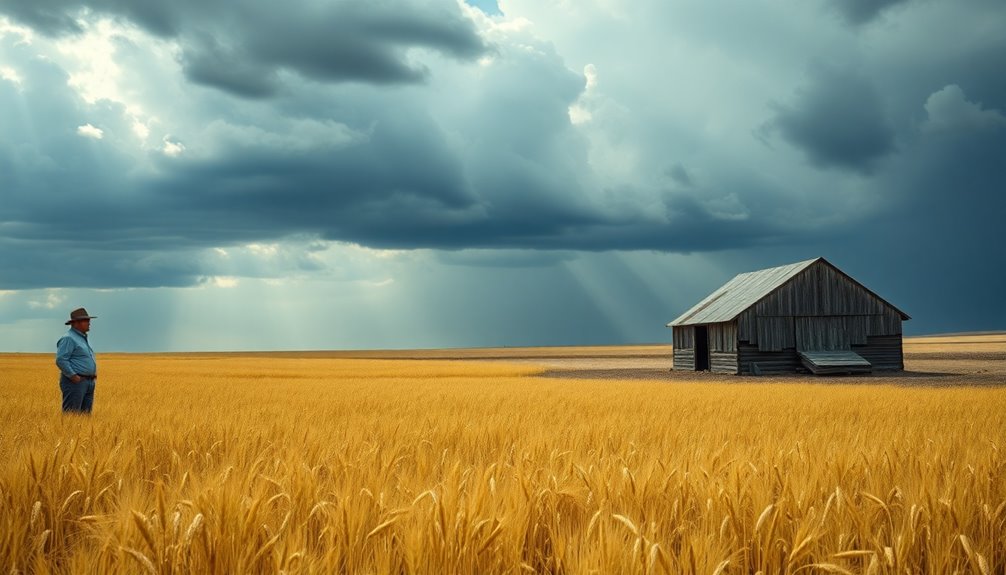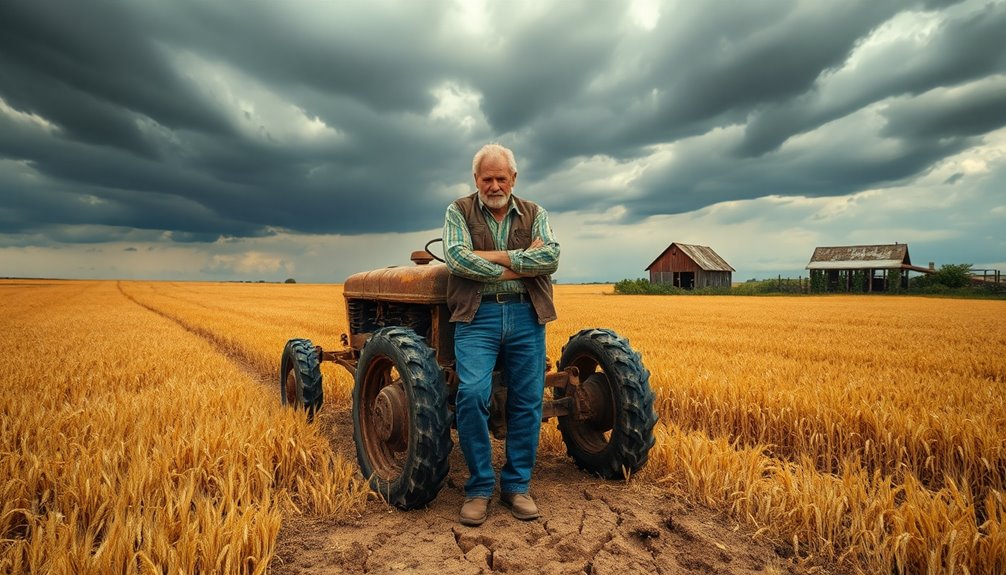Farmers in Kansas and Missouri often avoid discussing climate change due to fear of conflict and the influence of minority views in their communities. This reluctance silences important conversations and hampers collective adaptation efforts. While some farmers recognize the need for sustainable practices and implement adaptation strategies, a fear of disagreement can stifle open dialogue. Learning to create safe spaces for discussion could lead to better solutions and foster collaboration among farmers. There's more to explore on this topic.
Key Takeaways
- Many farmers in Kansas and Missouri exhibit skepticism about climate change, leading to reluctance in discussing the issue openly.
- Fear of conflict and differing opinions create a "spiral of silence," discouraging farmers from voicing their views on climate change.
- Anonymity is preferred for farmers when sharing opinions, reflecting the sensitivity surrounding climate discussions in the community.
- Despite uncertainty, many farmers recognize the importance of sustainable practices and show openness to learning new adaptation strategies.
- Establishing safe discussion spaces is crucial for fostering open dialogue and collaborative adaptation efforts among farmers facing climate challenges.

Climate change is reshaping the agricultural landscape for farmers in Kansas and Missouri. Rising temperatures and unpredictable weather patterns are disrupting your farming operations, reducing crop yields, and diminishing livestock productivity. The risks of pests and diseases are increasing, growing seasons are shifting, and soil fertility is declining. These challenges threaten not only your livelihood but also the local economy, with agriculture accounting for a significant portion of the region's greenhouse gas emissions.
Among your peers, there's a spectrum of beliefs regarding climate change. Some farmers recognize its reality and are actively implementing adaptation strategies, while others remain skeptical about human influence yet realize the necessity of sustainable practices. You might find yourself among those who are uncertain, open to learning and adopting methods that contribute to sustainability. Regardless of your stance, many of you're taking pragmatic steps to address the environmental challenges that climate change presents.
However, discussing climate change can be tricky. Fear of conflict and potential harm to your livelihood often leads to avoidance of the topic within your community. This "spiral of silence" means that if you feel in the minority, you're less likely to speak up, which can slow down vital adaptation efforts. Many of your fellow farmers prefer anonymity when sharing their views, reflecting how sensitive this issue is among you. Creating safe spaces for discussion is essential for breaking the silence on climate change.
Despite the reluctance to engage in conversations about climate change, you're already pursuing various adaptation strategies. Crop diversification, conservation tillage, and precision agriculture are just a few methods helping to improve resilience against changing conditions. Efficient water management and planting cover crops also play crucial roles in protecting your soil.
Ultimately, while climate change remains an unspoken challenge, it's clear that you and your fellow farmers must navigate these waters, finding ways to adapt and thrive in an ever-evolving agricultural landscape.
Frequently Asked Questions
What Are the Main Crops Affected by Climate Change in These States?
In Kansas and Missouri, climate change significantly impacts wheat, corn, and soybeans.
You'll notice that warmer temperatures and reduced moisture lead to declining wheat yields. Corn struggles with increased droughts and extreme heat, affecting its growth.
Soybeans face stress from rising temperatures, potentially reducing their yields.
To adapt, consider diversifying into drought-resistant crops like sorghum and millet, which can help maintain productivity and nutritional value as conditions change.
How Are Farmers Currently Adapting to Changing Weather Patterns?
Farmers are adapting to changing weather patterns by diversifying their crops and livestock, which helps spread risk.
They're exploring niche markets and adjusting planting dates to align with shifting seasons.
Sustainable practices like cover cropping and conservation tillage improve soil health, while precision agriculture tools optimize resource use.
What Role Do Government Policies Play in Farmers' Climate Discussions?
Imagine a farmer flipping through a weathered almanac, seeking guidance for tomorrow's challenges.
Government policies play a crucial role in your climate discussions. They provide funding, technical assistance, and incentives for adopting sustainable practices.
Programs like crop insurance and conservation initiatives help you adapt to changing conditions. By engaging with these resources, you can shape a more resilient agricultural future while fostering conversations about climate implications, ensuring you're not alone in facing these challenges.
Are There Any Local Resources Available for Farmers to Learn About Climate Change?
Yes, there are plenty of local resources available for you to learn about climate change.
The University of Missouri offers programs through its Center for Regenerative Agriculture, focusing on climate-smart practices.
You can also engage with the Climate-Resilient Crop and Livestock Project for financial support and education.
Additionally, community initiatives and USDA funding promote sustainable agriculture practices, providing you with networking opportunities to connect with other farmers and share valuable insights.
How Does Community Engagement Influence Farmers' Perceptions of Climate Change?
Did you know that nearly 70% of farmers say community opinions shape their views on climate change? Your engagement with fellow farmers can significantly influence how you perceive climate issues.
When you share experiences or discuss concerns, it fosters a sense of solidarity and understanding. However, if dominant community beliefs downplay climate concerns, you might hesitate to voice your thoughts, fearing conflict or alienation.
Open dialogues are essential for shifting perceptions and encouraging proactive adaptation.
Conclusion
So, while farmers in Kansas and Missouri might prefer to chat about crop yields and the best tractor models, climate change seems to be the elephant in the cornfield. After all, who needs to worry about rising temperatures when you can just pray for rain, right? Ignoring climate change is like planting seeds in barren soil—it's not gonna yield much. Maybe it's time to swap those "No Climate Talk" hats for ones that say, "Let's Chat About Our Future!"









